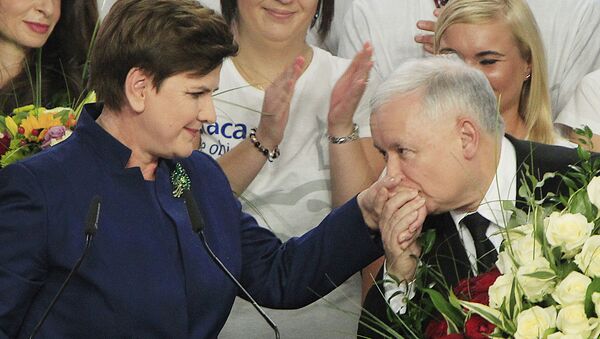“It says a lot that we are now activating the rule of law mechanism and putting Warsaw under supervision,” said Oettinger, who is EU Digital Economy and Society Commissioner.
The mechanism is the EU’s ‘framework for addressing systemic threats to the rule of law,’ and as a last resort allows the EU to withdraw voting rights from a member state if attempts at persuasion fail to change its path.
The tool was instituted in March 2014 and is set to be activated in the case of Poland at a Commission summit on January 13, where EU leaders will discuss the country’s controversial reforms.
The Commission’s proposal comes after the ruling Law and Justice (PiS) party in Warsaw ignored several of its warnings not to follow through with planned changes to the country’s constitution regarding the court system and the media, which have provoked public protests in Poland and criticism from journalists and politicians internationally.
EU-Kommissar Oettinger will Polen unter Aufsicht stellen Die Dinge werden schon ihren Lauf nehmen. https://t.co/RPXCUbRhbB @SPIEGELONLINE
— Franz W.Winterberg (@franzwi3) January 3, 2016
'New right-wing government in Warsaw: EU Commissioner Oettinger wants to put Poland under supervision,' reported Der Spiegel.
On Friday several directors from Poland’s state Telewizja Polska (TVP) network announced their resignations after the Polish Sejm (parliament) approved amendments to the country’s media law on Thursday. The new legislation, which is now set to be signed into law by Polish President Andrzej Duda, gives the government the right to appoint and dismiss the supervisory boards and management of public television and radio stations.
Before the law was passed the Vice-President of the EU Commission, Frans Timmermans, wrote the second of two letters to Poland’s Foreign and Justice Ministers warning that the government’s plans contravene EU law, reported FAZ.
“The freedom and pluralism of the media are crucial to a pluralistic society in a member state that respects the common values on which the Union is based,” Timmermans wrote in a letter to the Polish government on Wednesday, in which he cited the EU Treaty protocol on the “need to preserve media pluralism.”
The new law requires 13 of the 15 judges to be present, and the agreement of two-thirds of them, in order to reach a decision. Previously, a simple majority of nine judges was required. The more difficult conditions for a decision make it harder for the court to reach agreement, and act as a check on the government.
If sanctions are eventually imposed against Warsaw, it would be the first time that an EU member state has been denied its full membership rights since 2000, when the then 14 member states of the EU imposed diplomatic sanctions on Austria.
The largely symbolic move was undertaken because Austria’s far-right Freedom party, led by Jorg Haider, joined the country’s ruling coalition. The diplomatic sanctions froze the EU’s bilateral relations with Austria for several months, though its participation in EU committees was unaffected.




